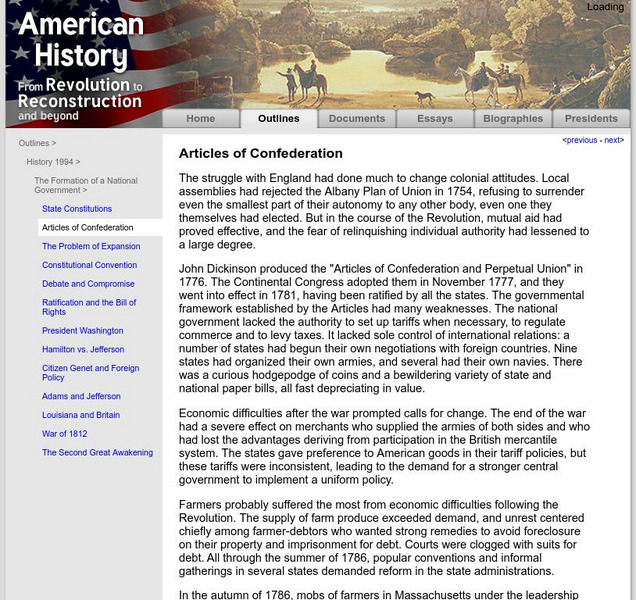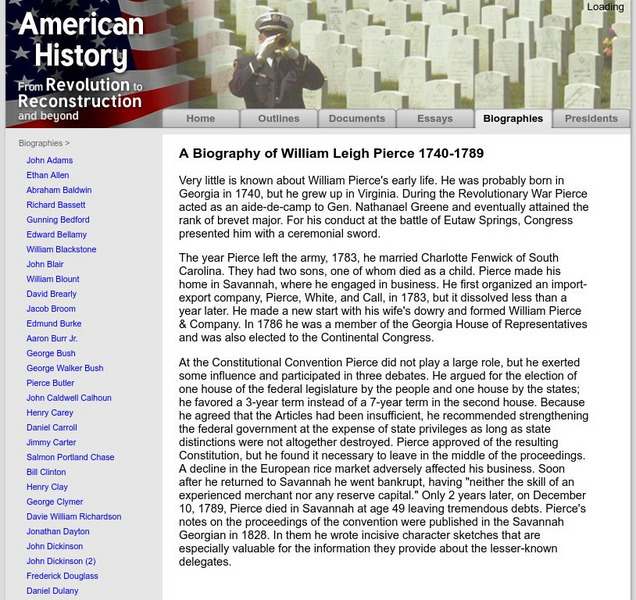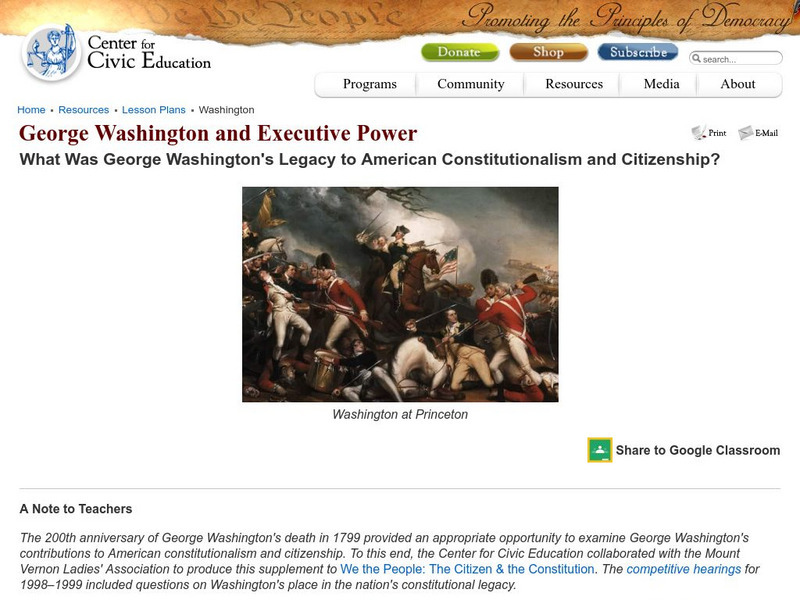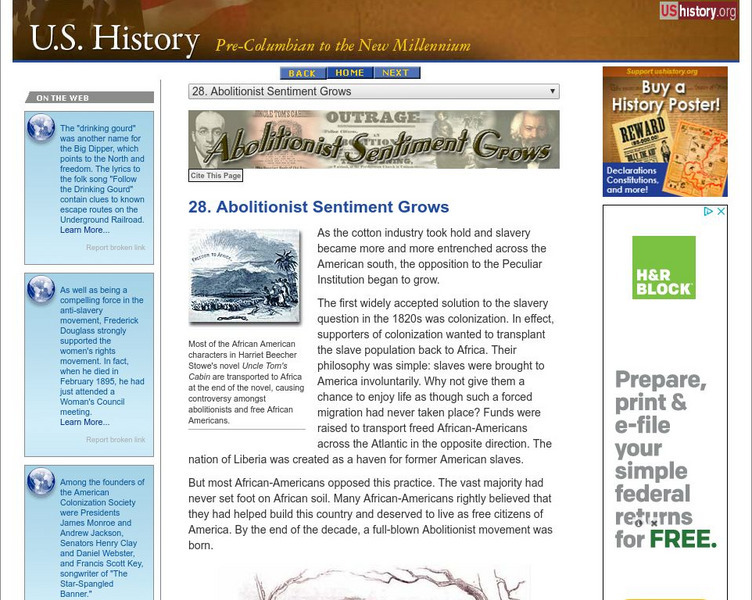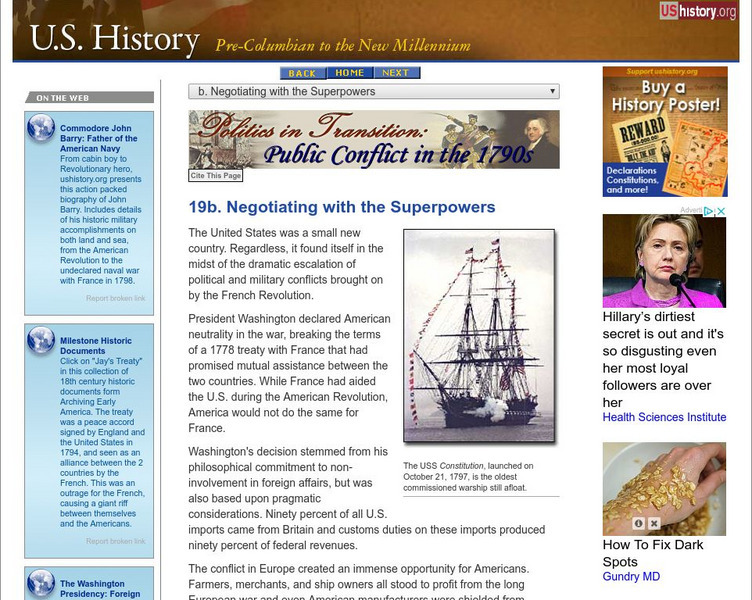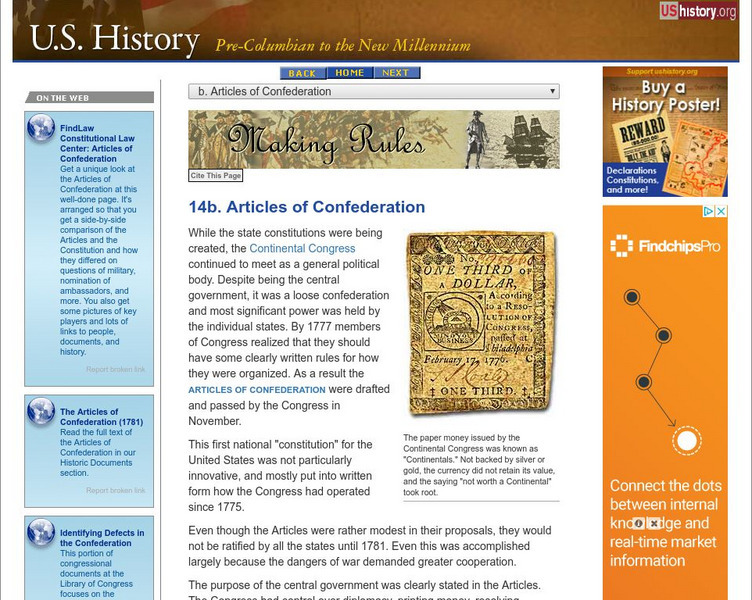Other
Binghamton University: Lincoln, Labor and Liberation
The free labor ideology of the nineteenth century was grounded in the beliefs that Northern free labor was superior to Southern slave labor. It was this free labor ideology and not the republicanism of the Revolutionary War era that...
Other
British Battles: The Battle of Yorktown 1781
The British called the Americans rebels! But in the end, had to surrender to them. Read the exciting account, complete with artwork and facts, of this famous battle that led to the independence of the American states.
University of Groningen
American History: Outlines: Drafting the Constitution
Essay covers from the Articles of Confederation and the problems of disunity of the new states after the Revolutionary War, internally as well as externally, to the Constitutional Convention, an attempt to address the Articles' problems....
University of Groningen
American History: Outlines: Formation of a National Government
This site from the American Revolution Project discusses the state of the union at the end of the Revolutionary War and how the events of the time led to the failure of the Continental Congress and the Articles of Confederation.
University of Groningen
American History: Outlines: Emergence of Colonial Government
Detailed essay which shows how colonial self-government developed prior to the Revolutionary War.
Houghton Mifflin Harcourt
Harcourt: Biographies: Pierre Charles L'enfant
A description of L'Enfant's service in the United States, including service in the Revolutionary War and planning the layout for the nation's capital. (In Spanish)
Houghton Mifflin Harcourt
Harcourt: Biographies: Nathan Hale
This brief biography presents a good review of the life of Nathan Hale, a famous Revolutionary war captain and spy. (In Spanish)
Digital History
Digital History: The Sections [Pdf]
Soon after the end of the Revolutionary War, the characteristics of the various parts of the new United States established themselves. Find out about the sectionalism, economy, and needs in the country in the early 1800s--the...
University of Groningen
American History: Biographies: Lord North (1713 1792)
Lord North was Prime Minister of Great Britain from January, 1770 to March, 1782. His early successes as Leader of the House and his efforts to cut the national debt brought him the confidence of a faction-ridden Parliament and the favor...
University of Groningen
American History: Biographies: William Leigh Pierce 1740 1789
Very little is known about William Pierce's early life. He was probably born in Georgia in 1740, but he grew up in Virginia. During the Revolutionary War Pierce acted as an aide-de-camp to Gen. Nathanael Greene and eventually attained...
University of Groningen
American History: Outlines: Victory and Independence
Brief overview of the final events of the American Revolutionary War leading to the signing of the Treaty of Paris, 1783 and American independence.
AdLit
Ad lit.org: Reading Discussion Guide: Chains by Laurie Halse Anderson
As the Revolutionary War begins, 13-year-old Isabel wages her own fight for freedom. Promised freedom upon the death of their owner, Isabel and her sister, Ruth, in a cruel twist of fate become the property of a malicious New York City...
US National Archives
Nara: Prologue Magazine: Women and Naturalization
A lengthy essay on George Washington proposing that his real accomplishments as first President of the U.S. and winner of the Revolutionary War have been overshadowed by the myths and stories of the Cherry Tree, teeth, and no lies....
Georgia Humanities Council and the University of Georgia Press.
New Georgia Encyclopedia: History and Archaeology: Indigo
Discussion of how production of the blue dye, indigo, helped boost the economy of Georgia and South Carolina in the seventeenth and eighteenth century until the Revolutionary War when England stopped buying it and production collapsed.
Polk Brothers Foundation Center for Urban Education at DePaul University
De Paul University: Center for Urban Education: Valley Forge [Pdf]
"Valley Forge" is a one page, nonfiction, reading passage about conditions at Valley Forge during the Revolutionary War including a German soldier, von Steuben, who helped America win. It is followed by questions which require students...
US Army Center
U.s. Army Center of Military History: Rufus King
A good biographical sketch of Rufus King, one of the signers of the Constitution. He was a delegate from Massachusetts. He served in the Revolutionary war and was later a senator from New York.
Other
John Hamill: Yorktown
Revolutionary War enthusiast, John Hamill, presents pictures with descriptions of the terrain where the siege of Yorktown took place.
Center For Civic Education
Center for Civic Education: George Washington and Executive Power
George Washington had a role in establishing our nation from the Revolutionary War through his presidency. He was a commander, a delegate to the Constitutional Convention, and a reluctant first President. Analyze his political...
Other
American Presidents: George Washington Biography
This resource presents a biographical sketch of America's first president, George Washington, including details of his early life, the American revolutionary War, his presidency, and religion. Provides links to further resources.
Smithsonian Institution
National Portrait Gallery: Who Am I? (Portrait Puzzler)
Match the portraits of eight famous Americans who played major roles in the American Revolution with their famous deeds. A short exercise that can be used by individual learners to test their understanding of basic U.S. history content...
Library of Virginia
Virginia Memory: The Battle of Yorktown Sort It Sets
In this lesson, students examine why the Battle of Yorktown was a turning point in the Revolutionary War using primary sources.
Independence Hall Association
U.s. History: Abolitionist Sentiment Grows
Abolitionists had been active since the end of the Revolutionary War, but in the 1830s they became more radical in their demands to end slavery. See what their solutions were, and read about how abolitionist views were thwarted in the...
Independence Hall Association
U.s. History: Negotiating With the Superpowers
Read about the problems President George Washington had with foreign affairs. Both France and Great Britain ignored American sovereignty and claims of neutrality. Read about Great Britain's disregard of the Treaty of Paris which ended...
Independence Hall Association
U.s. History: Articles of Confederation
During the Revolutionary War, it was necessary to put together some sort of central government, primarily to raise and pay an army. Read about the rules finally passed by Congress in 1777, called the Articles of Confederation. See what...
Other popular searches
- American Revolutionary War
- Revolutionary War Poems
- Causes of Revolutionary War
- Revolutionary War Battles
- Revolutionary War Art
- Revolutionary War Music
- Unit on Revolutionary War
- The Revolutionary War
- Revolutionary War Unit
- Revolutionary War History
- U.s. Revolutionary War
- Revolutionary War on Wednesday





